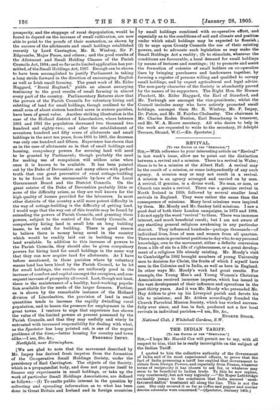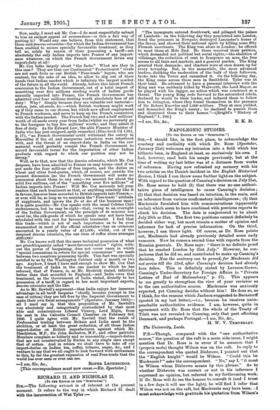[To TRY EDITOR or TER "SPECTATOR." _I
I quoted to him the collective authority of the Government of India and of its most experienced officers, to prove that the fact of India possessing a tariff has enabled that Government to obtain from foreign Powers, and especially from France, whatever terms of reciprocity it has chosen to ask for, or whatever may seem to be beneficial' to Indian trade. To this he now replies very courteously, but not very logically :—" Sir Roper Lethbridge excusably jumps to the conclusion that India secured most- favoured-nation' treatment all along the line. This is not the case. She only secured it so far as coffee and pepper and similar denrees colcnsiales were concerned."—(Spectator, January 14th.)
Now, really, I must ask Mr. Cox—I do most respectfully submit to him an earnest appeal ad verecundiam—is this a fair way of putting it? Would any one believe, from this statement, that these said denrees coloniales—for which the Indian Government has been enabled to secure specially favourable treatment, as they tell us, solely by reason of their possessing a tariff—are absolutely the only Indian imports into France of any import- , ance whatever, on which the French Government levies any import-duty at all ! Mr. Cox talks largely about "the facts." What are they in this case ? They are that our Continental" Protectionist" rivals are not such fools as our British " Free-trade " bigots, who are content, for the sake of an idea, to allow to slip out of their hands that Indian market which is infinitely the largest market of the future in all the world. Already, before this latest French concession to the Indian Government, out of a total import of something over five millions sterling worth of Indian goods annually imported into France, the French Government has
admitted over four millions sterling worth absolutely free of all duty ! Why ? Simply because they are valuable raw material—
cotton, jute, oil-seeds, &c.—which British workmen might work up if they came to our shores, but which now afford employment to French workmen, and serve to keep up the French connection with the Indian market. The French buy two and a half millions' worth of oil-seeds every year from India (whilst we perversely go to the foreigner to buy five millions' worth), and they admit it free of duty. As Sir Edward Law, the able Finance Minister of India who has just resigned, aptly remarked (Blue-book Cd 1,931, p. 17), " no French Government could withstand the outcry in Marseilles if the oil and margarine industries were interfered with, and the threat of an export-duty in India on the raw material would probably compel the French Government to accord favourable terms for the importation of other Indian products with regard to which our position may not be strong." Well, as to that, now that the denrees coloniales, which Mr. Cox despises, have been admitted to France on easy terms—and if we put aside the four millions of free imports, and the duties on wheat and other food-grains, which, of course, are outside the present discussion (as the French Government will make no concession about them to any one)—we account for about the solid five millions, out of the "something over five millions" of Indian imports into France ! Will Mr. Cox seriously tell your readers that such treatment as that, or anything remotely like it in favour, has ever been accorded to British imports into France,— or ever will be, so long as we maintain the " Free-trade " attitude
of suppliants, and ignore the Do ut des of the business man? It is quite possible—Mr Cox speaks with the usual Cobden Club
cocksureness, but he may be right—that, owing to an oversight of the Indian Government, on the principle of de minimis non carat iez, the silk-goods of which he speaks may not have been scheduled with the rest for favourable treatment. I find that this trade—which is not of such importance as to be even enumerated in most of the official schedules—has on occasions amounted to a yearly value of £11,000; whilst, out of the despised denrees coloniales, the one item of coffee alone averages .2260,000!
Mr. Cox knows well that the mere technical possession of what are grandiloquently called " most-favoured-nation " rights, with- out the power of bargaining, does not cover cases in which "special concessions in return for special concessions" are made between two countries possessing tariffs. This fact was specially
notified to us by the Washington Cabinet only a- month or two
ago. Anyhow, I trust I have said enough to show Mr. Cox that the treatment of India in the one market to which he has referred, that of France, is, as Mr. Brodrick stated, infinitely better than that accorded to England,—and India owes that treatment, as the Government of India stated, directly to her possession of a tariff, in regard to her most important exports, denrtes coloniales and the like.
As to Mr. Sawtell's argument—that India enjoys her immense advantage in all tariff bargains " chiefly because (except in the case of cotton) they are left free by the Imperial Government to make their own fiscal arrangements " (Spectator, January 14th)— all I need say is, that this proposition of Mr. Sawtell's was absolutely and categorically contradicted by that most able and conscientious Liberal Viceroy, Lord Elgin, from his seat in the Calcutta Council Chamber on February 3rd, 1896. I quite agree with Mr. Sawtell that the result of Preferential trading between Britain and India must be the abolition, or at least the great reduction, of all those Indian import-duties on British manufactures against which Mr. Shackleton, M.P., Sir John Rolleston, M.P., and other patriotic Members complain so bitterly and so reasonably,—import-duties that are not countervailed by Excise in any single case except that of cotton. And in return we shall have to take off our import-duties on Indian tea, coffee, tobacco, sugar, &c., and I venture to say that we all ought to look forward with enthusiasm to this, by far the greatest expansion of real Free-trade that the world has ever seen or ever can see.
—I am, Sir, &c., ROPEn LETHBRIDGE.
RICHARD H. AND NICHOLAS IL























































 Previous page
Previous page